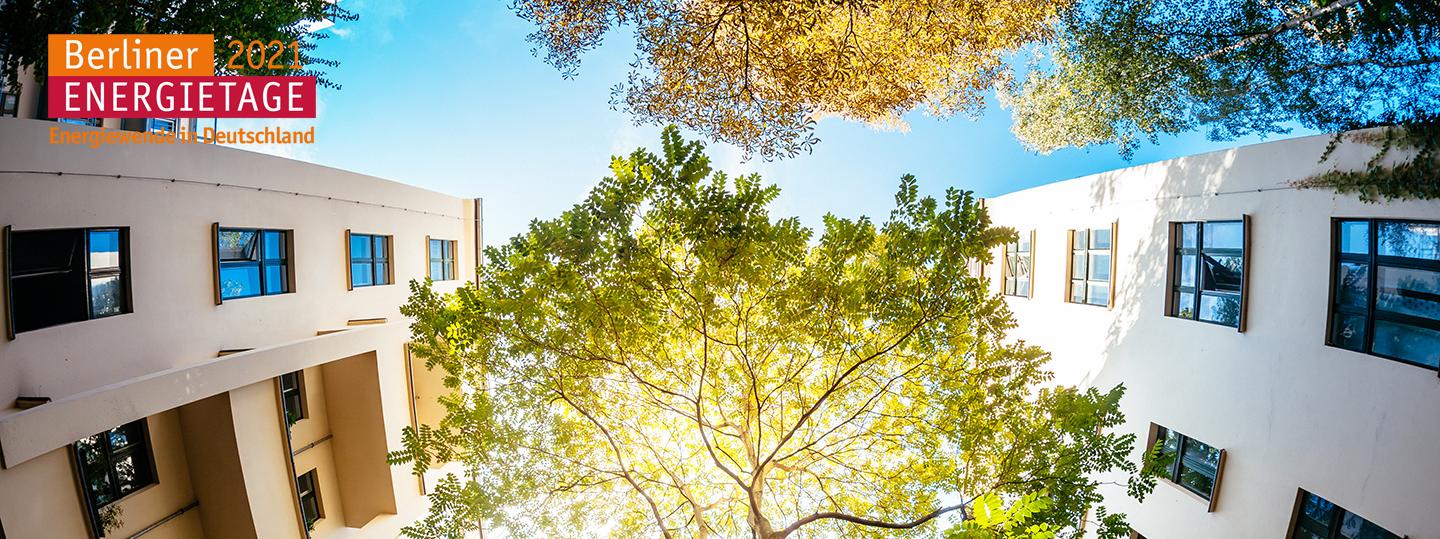
Berliner Energietage 2021: On the way to the climate-neutral building
Buildings play a key role in achieving the Europe-wide goal of climate neutrality by 2050. According to the European Commission, in 2020, the building sector accounted for around 36 % of CO2 emissions. In addition, three quarters of the EU's building stock is still considered simply not to be energy efficient. Climate protection and buildings must therefore be brought together consistently in the coming years in the sense of holistic zero-carbon strategies, if the ambitious goals by 2050 are to be achieved.
What does the building sector expect in terms of green deal, renovation wave and taxonomy? How is the real estate industry positioned in this transformation process? And with what measures and solutions can the path to a climate-neutral building be designed in practice? Exciting and innovative answers to these questions were provided by the expert panel "The climate-neutral property - from 'why' to 'how'", organized by ENGIE Deutschland as part of the digital Berliner Energietage 2021. The high relevance of the topic also underlined the lively interest in the event with over 330 participants, including from the fields of architecture and real estate as well as from politics, universities and administrative authorities.
New impulses for pragmatic measures to protect the climate in buildings are needed
Dr. Frank Höpner, Head of Strategy at ENGIE Deutschland, outlined a key challenge on the way to a climate-neutral building right at the beginning of the panel at the Berlin Energy Days. "It is clear that we need measures for climate protection in buildings. We are faced with the question of how these can be implemented pragmatically. We are currently seeing an imbalance here between those who are supposed to modernize – that is, the owners – and those who are able to implement it," says Höpner. His appeal: "Impetus is needed to give energy service providers, as professionals in the energy transition, a chance to implement climate neutrality."
Environmentally friendly buildings no longer a "nice-to-have"
Susann Bollman from the Executive Board of the German Corporate Initiative Energy Efficiency e.V. (DENEFF) offered a compact overview of the political framework towards a climate-neutral building. In her lecture "Green Deal – Renovation Wave – Taxonomy: Where is the Building Sector Headed?" she particularly highlighted the dangers of asset devaluation in the real estate sector if future climate change requirements are not met. Accordingly, measures to protect the climate in buildings are no longer a "nice-to-have", which is why it is advisable for investors and financiers to examine the risks in their portfolios and act in a proactive manner.
Combining sustainability and return – ESG as an opportunity for growth of the century
Susanne Eickermann-Riepe, CEO of RICS Deutschland, developed this idea further in her lecture "How do sustainability and return fit together?". In particular, she predicted significant changes to the DNA of the real estate industry. For example, it is to be expected that investors will increasingly focus on an extended sustainability concept in products and project developments, i.e. the triad of environmental, social and responsible corporate governance (environment, social and governance, "ESG"). "The return alone will no longer suffice. The real estate value will be extended by an environmental value and a social value to a new total value," emphasized Eickermann-Riepe. In addition, the development offers the opportunity for growth of the century, the RICS CEO emphasized the enormous potential in the building sector.
Practical measurement method for the sustainability of real estate
How can the sustainability of real estate be measured and compared? Dr. Markus Bell, Managing Director of Bell Management Consultants, presented a practical solution for such an investigation in his presentation "ESG Score – Implementation and Communication Tool on the Road to CO2 Neutrality". A robust industry standard for measuring the sustainability performance of real estate and portfolios is used, which was developed by the ECORE initiative, which includes around 40 European stockholders as well as the associations ZIA and BVI. The classification of the objects is based on a point scale from zero to 100. Stakeholders should be able to easily identify how a property or portfolio performs in relation to climate targets and ESG criteria and where the greatest potential for optimization lies on the way to a climate-neutral building.
Technological and economical approaches of the heat transition under the magnifying glass
Simon Greif, research associate at the Forschungsstelle für Energiewirtschaft e.V. in Munich, opened up an exciting insight into the technological and economic approaches for the heat transition by means of the decarbonization study of his institute. Accordingly, the replacement of thermostatic valves at the current CO2 prices alone is an economic self-starter. Whether solar thermal energy, air-ground heat pumps or the insulation of the building shell: "All other measures require regulatory intervention to become financially attractive," Greif summarized the study results. While he sees no role for hydrogen in the area of space heating and hot water in the foreseeable future, the use of biomass in the area of monument protection, for example, is recommended.
Conclusion: No alternative to focusing on climate protection in buildings
In the final round of discussions, Dr. Julia Verlinden (BÜNDNIS 90/Die Grünen Bundestagsgruppe), Prof. Dr. Martin Neumann (FDP Bundestag faction), Karsten Möring (CDU/CSU Bundestag faction) and Timon Gremmels (SPD Bundestag faction) presented how their parties intend to shape the broader framework in the future. In addition, the participants discussed minimum requirements for existing buildings as well as packages of measures that should be implemented primarily in buildings.
"The Members of Parliament made it clear across the board that there is no way around increasing energy efficiency. In addition to technologies, innovative business models for decarbonization deserve more attention. In addition to the broad commitment to funding, clear legal requirements seem to become relevant for the worst energy buildings," Christian Noll, Managing Director of DENEFF and moderator of the Berlin Energy Days Panel, drew a clear conclusion to the discussion.
Our Expert










